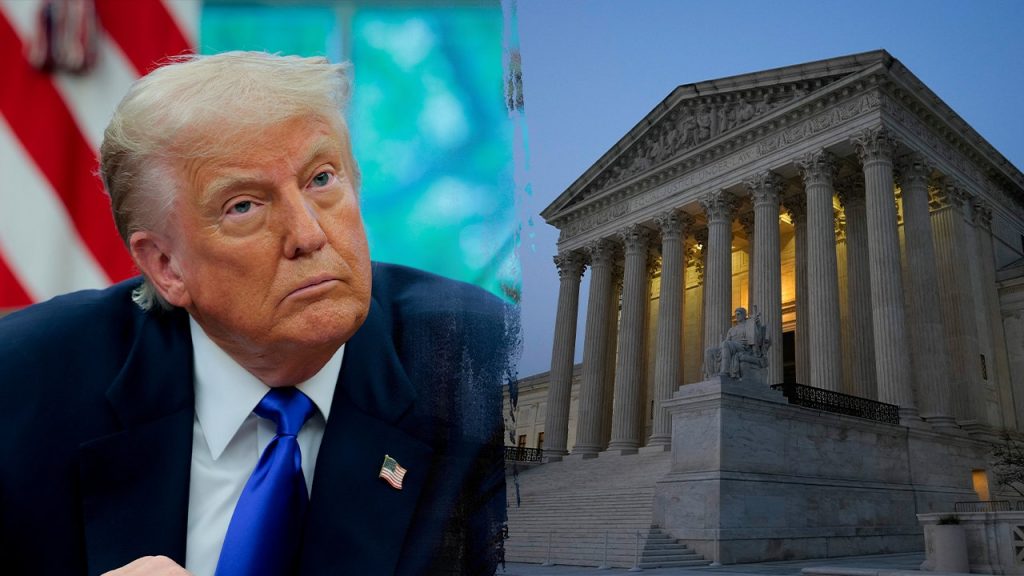The Battle Over Birthright Citizenship: Trump’s Challenge to a Constitutional Guarantee
In a bold move that could fundamentally alter American citizenship rights, the Trump administration has petitioned the Supreme Court to review an executive order that would restrict birthright citizenship in the United States. This high-stakes legal challenge targets a constitutional principle that has stood for over 120 years, potentially affecting thousands of children born on American soil each year. The Supreme Court is expected to decide in the coming weeks whether to hear this consequential case that strikes at the heart of the 14th Amendment’s Citizenship Clause.
At the center of this controversy is the longstanding interpretation of the 14th Amendment, which has traditionally guaranteed citizenship to virtually all children born on U.S. soil regardless of their parents’ immigration status. Trump’s executive order seeks to narrow this interpretation significantly, limiting automatic citizenship only to children of U.S. citizens and lawful permanent residents. Solicitor General D. John Sauer’s petition argues that the current understanding is “mistaken” and has had “destructive consequences,” improperly conferring “the privilege of American citizenship on hundreds of thousands of unqualified people.” This represents a direct challenge to the Supreme Court’s landmark 1898 ruling in “United States v. Wong Kim Ark,” which established that a San Francisco-born man whose Chinese parents were ineligible for naturalization was nonetheless an American citizen by birth. That decision cemented the principle of “jus soli” (citizenship by birth on American soil), with only narrow exceptions for children of diplomats, foreign occupiers, and sovereign tribal nations.
The legal debate hinges on different interpretations of the 14th Amendment’s phrase “subject to the jurisdiction thereof.” Supporters of the executive order, including John Eastman who advised on drafting the policy, argue that this language requires “complete” jurisdiction, meaning full political allegiance to the United States rather than simply being born on American soil. According to this view, children of temporary visitors or undocumented immigrants retain allegiance to their parents’ home countries and therefore don’t meet the constitutional requirement for birthright citizenship. Critics counter that this interpretation contradicts both the text and history of the amendment. UC Berkeley law professor John Yoo points out that the Framers borrowed British “jus soli” traditions, and that Reconstruction lawmakers specifically expanded citizenship to ensure formerly enslaved people and their descendants were fully included in the American polity. As Yoo notes, “It is simply beyond doubt that the Framers operated by borrowing and adopting common law principles… to adopt an interpretation that rejects that meaning, we would need historical evidence that the Framers had adopted a radically new interpretation.”
The executive order has already faced significant legal challenges, with federal courts initially blocking it through broad injunctions, though the Supreme Court later narrowed those rulings. The ongoing legal battle has drawn strong reactions from various stakeholders. John Eastman praised Solicitor General Sauer for “expeditiously seeking Supreme Court review” and expressed confidence that the Court would restore what he considers “the original meaning of the clause.” Meanwhile, civil rights organizations have mounted vigorous opposition. Cody Wofsy of the ACLU stated, “Every court to have looked at this cruel order agrees that it is unconstitutional… we are fighting to make sure President Trump cannot trample on the citizenship rights of a single child.” Devon Chaffee, executive director of ACLU-NH, warned that the order “directly opposes our Constitution, values, and history, and it would create a permanent, multigenerational subclass.” In a notable development, Justice Sonia Sotomayor suggested in a recent dissent that class action lawsuits might provide an effective strategy for challengers, encouraging parents of affected children to “file promptly” and urging lower courts to “act swiftly.”
The potential implications of this case extend far beyond legal technicalities, touching on fundamental questions about American identity, immigration policy, and constitutional interpretation. If the Supreme Court were to uphold Trump’s order, it would represent one of the most significant reinterpretations of the 14th Amendment since its ratification after the Civil War. Such a ruling could create a new category of American-born non-citizens—children who, despite being born on U.S. soil, would lack the rights and protections of citizenship. Karla McKanders of the Legal Defense Fund characterized the order as “an unlawful attempt to entrench racial hierarchies,” emphasizing that “Citizenship is a right afforded to us by birth, not by privilege.” This perspective highlights the profound stakes involved: whether birthright citizenship remains a cornerstone of American democracy or becomes subject to new restrictions based on parents’ immigration status.
As the Supreme Court considers whether to take up this case, Americans face a pivotal moment in constitutional history. The outcome could either reaffirm the long-established principle that virtually all children born on American soil are citizens by right, or fundamentally alter this understanding to create a more restrictive framework. The debate touches on competing visions of American belonging—one that emphasizes the inclusive nature of citizenship acquired through birth on national soil, and another that ties citizenship rights more closely to parents’ legal status and political allegiance. Whatever the Court decides, this challenge to birthright citizenship represents one of the most consequential constitutional disputes in recent memory, with lasting implications for generations of children born in the United States.















